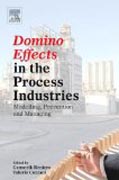
Domino effects in the process industries: modelling, prevention and managing
Reniers, Genserik
Cozzani, Valerio
The topic concerns the so-called 'domino effects' or accidents with escalation effects within the chemical industry. Domino effects can be defined in a number of ways. For a list of domino effect definitions, see Reniers' article in the Journal of Hazardous Materials 177 (2010). The most widely used definitionis that of Delvosalle (1998): "A domino effect is a cascade of accidents (domino events) in which the consequences of a previous accident are increased by the following one(s), spatially as well as temporally, leading to a major accident.". To the best of the authors' knowledge, no book is currently available that specifically deals with the important topic of preventing domino effects in the chemical and process industries. However, a large amount of academic research has been carried out since the EU Seveso-II Directive entered into force (1996), requiring that such low frequency/high consequence events are considered in companies' safety reports (art. 8). Academic interest is evident by the considerable amount of scientific papers on the subject published since 1996. The topic has thus gained importance within the academic world. With respectto industry, domino effects and their prevention are mainly considered important due to the legislative requirements, that goes beyond the capabilities of simplified domino assessment methods used before the year 2000. Since the 2003Amendment of the Seveso-II Directive, imposing even more strict regulations on the reporting of domino scenarios and on the identification of domino effects outside the boundaries of a single industrial site, domino effects constitute an issue that needs to be specifically addressed in the management of industrial sites. Moreover, especially since 9/11, the possibility of domino effectshas become important also from a security perspective, thus from the viewpoint of preventing and/or mitigating intentionally induced escalation events (e.g. by terrorists or by disgruntled employees). Presents Domino effects from a technological as well as a managerial (non-technological) perspective- holistic/multidisciplinary approach Covers Domino effects from a safety (non-intentional) as well as a security (intentional) perspective-guidelines for preventing accidents and actions to be taken Written for academics as well as industrialists (easy to understand, yet advanced science)-holistic overview of the topic from theoretical and practical aspects Provides State-of-the-art methodologiesfor domino effect assessment-easy to understand methods for assessment of domino effects Provides worked examples on key-methodologies-real life situationsenabling the section of the most appropriate methodology Includes Glossary-clear and unambiguous definition of terms used throughout the text which avoids misunderstandings
- ISBN: 978-0-444-54323-3
- Editorial: Elsevier
- Encuadernacion: Cartoné
- Páginas: 310
- Fecha Publicación: 01/02/2013
- Nº Volúmenes: 1
- Idioma: Inglés
